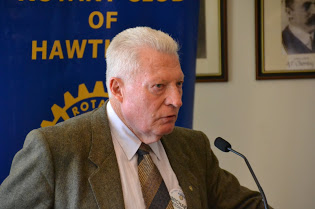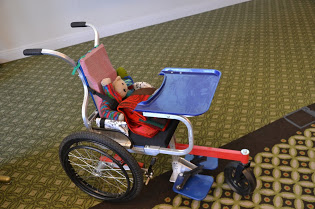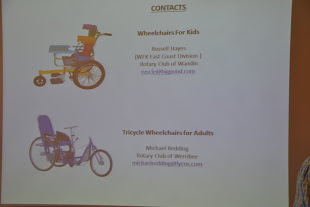Michael Redding...Wheelchairs for Vietnam
Posted
on Apr 26, 2016
 |
 |
 |
Michael Redding our last guest speaker is a retired teacher who went to Vietnam-Cambodia in 2010 as an independent traveler. He was taken by the beautiful landscapes set in the backdrop of those ancient cultures and traditions, and by some of the friendliest people to be found anywhere. Sadly he also saw significant poverty and a great number of physically disabled people.
Such disability often manifest as restricted mobility—perhaps from untreated infections, birth defects and/or the aftermath of past war activity.
Michael, a recently inducted Rotarian at Werribee RC, told of a program (of Rotary) in which he is very active to provide wheelchairs to these disabled. It was a revelation to hear about a workshop in Scarborough Perth, staffed by volunteer Rotarians making wheelchairs at the cost of about $200 per unit for use in Vietnam and Cambodia.
He emphasized a key point often overlooked, namely that the provision of welfare from Australia to overseas communities needs a recipient/partner at the site to sustain delivery etc. Rotary Australia often interacts with fellow overseas clubs but Vietnam does not yet approve of Rotary or like organizations.
Cambodia does there is a Phnom Penh RC and so provides the logistical base for these wheelchairs (built for kids) to go and be distributed there. As an aside Michael told of his experience at our own DIK warehouse loading a container with these wheelchairs.
A link with NTCM (“ Nguoi Toi Cuu Mang”) and some wonderful local Vietnamese contacts whom Michael told of provides a basis for delivery of wheelchairs to disabled adults in Ho Chi Minh City. Michael brought the context to a personal level by highlighting individual stories with pictures of how wheelchairs had changed lives of specific people—the audience would never forget the tale of Bah a woman immobilized by an accident.
The third location was Hoi An in Vietnam where connection with a UK supported foundation (with links to RMIT) the Kianh Foundation Day Centre provides a way to deliver wheelchairs to disabled children in that city.
Michael concluded by noting the ongoing nature of the program. A $300 donation suffices to provide a wheelchair. Often there is a small residue with which some food can be added for the benefit of the wheelchair recipient.